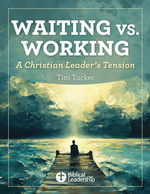The most heavenly minded among us often have the greatest impact on earth. But does that mean we should only focus on the next life?
Do you need a perspective shift? In this helpful leadership book, Tim Tucker explores how holding a clear vision of the “next” changes how we live and lead in the “now.”
Tim Tucker encourages the weary leader that we don't have to choose between waiting and working. Christian life and leadership is a harmonization of these two states of being: we wait and work; we work while waiting.
Did Jesus really mean what He said? That we would do greater things than Him? We long to see God’s name honored across the world. But how is this possible? Can we really expect to do greater things than the Lord Jesus Christ?
Not only did Nehemiah reject the privileges normally afforded to someone in his position, but he also used his personal resources to provide for his leadership team.
What kind of leadership do we need in the 21st century? Do you know the answer to this question?
Christlike leaders should strive to be Jesus-followers.
How do we keep our focus in a world where there are so many things vying for our attention?
I find one of my most frustrating attributes is how easily distractable I am. In trying to multi-task, I can compromise my effectiveness and run the risk of doing multiple things badly.
If you are a Christian leader, then it is inevitable that there are two challenges you are going to face at some point in your leadership. Firstly, the challenge of leading the grieving. The second challenge is leading while grieving. As biblical leaders, I believe we need to be equipping ourselves in this area.
One of the biggest communication issues many of us face is truly listening to people rather than simply waiting for a long enough pause for us to be able to spew out our opinions (and if a pause doesn’t come, we just butt in regardless).
In my view, leaders should not lurch from crisis to crisis, or even from glory to glory, without seeking to recognize the specific thread of grace that God is weaving through their lives.
The best that insecure leaders can hope for is fruit proportional to their effort. They can struggle and toil and perhaps see some fruit for their labors. But at what personal and relational cost?
I believe that Christian leaders can live with impact beyond their human effort because of the power of God working in and through them. When their focus is on glorifying God, Christian leaders can experience exponential fruit.
For so many leaders, our identity is wrapped up in our work and activity. We find our value and sense of worth in the work of leadership. The danger in this is that there is a very fine line between working for God out of love for him and working for God to earn his approval.
I believe we are called to lead with exponential impact that is disproportionate to our efforts. In fact, Scripture doesn’t use the language of success but of fruitfulness.
Perception is powerful! In particular, as Christian leaders, how we perceive what God is doing in the world will critically shape our approach to life and ministry.
I’ve been in non-profit leadership for more than 20 years. The thing about NPO leadership is that so much of it is learned on the job. Although there are some great courses these days, often the CEOs of NPO have to learn from the school of hard knocks. Here are 10 tips for non-profit CEOs.
This is by no means an exhaustive list but provides an initial biblical framework for Christ-like character development.





















